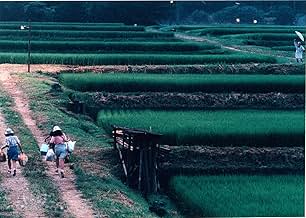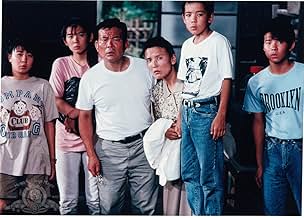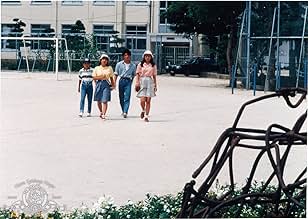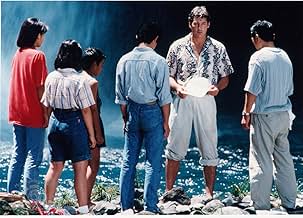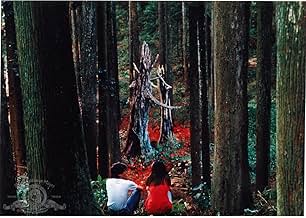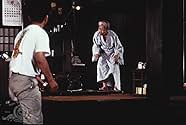VALUTAZIONE IMDb
7,2/10
7970
LA TUA VALUTAZIONE
La risposta di tre diverse generazioni alla bomba atomica di Nagasaki.La risposta di tre diverse generazioni alla bomba atomica di Nagasaki.La risposta di tre diverse generazioni alla bomba atomica di Nagasaki.
- Regia
- Sceneggiatura
- Star
- Premi
- 5 vittorie e 7 candidature totali
Richard Gere
- Clark
- (as Richâdo Gia)
Mieko Suzuki
- Minako
- (as Mie Suzuki)
Recensioni in evidenza
A beautiful, beautiful film. If you only know Kurosawa through Seven Samurai then this will come as something of a shock. Gentle, sensitive, moving and uplifting. The cinematography is sumptuous with plenty of touches that let you know that this is no ordinary film maker. By far the best of his later films in my opinion.
Don't be confused by the 'starring Richard Gere' tag. He only has a minor part, though he takes it well.
Just go and see it!
Don't be confused by the 'starring Richard Gere' tag. He only has a minor part, though he takes it well.
Just go and see it!
When I saw this movie, I remembered Louis-Ferdinand Celine's book, "Journey to the End of the Night", a anti-war book. Reading reviews about the movie, listening to what people in the US had to say, seeing the reaction of the American media to this movie, I was sad, simply sad. This movie is not about Japan, it's not about America, it could have been anywhere a war had happened.
This movie is a poem against war and the scars it leaves forever deep in the mind of the people who suffered those wars. Those who didn't suffer a war are lucky, and shouldn't be blamed for being this lucky, but they should see movies like this to understand what war is about. The world is never better after war. The first ones to agree to settle things through warfare are the ones who didn't suffer war. There are no winners in a war, just remember.
I'm sorry that all those who felt attacked in their pride as Americans are missing the point of this movie. If your father or your grandfather, or your friend has been to war, just listen to them.
The performance of the grandmother will make you forget you're watching a movie! It is filmed simply and un-pretentiously, though is a very emotional film.
Enjoy.
PS: Oh and I'm not Japanese...
This movie is a poem against war and the scars it leaves forever deep in the mind of the people who suffered those wars. Those who didn't suffer a war are lucky, and shouldn't be blamed for being this lucky, but they should see movies like this to understand what war is about. The world is never better after war. The first ones to agree to settle things through warfare are the ones who didn't suffer war. There are no winners in a war, just remember.
I'm sorry that all those who felt attacked in their pride as Americans are missing the point of this movie. If your father or your grandfather, or your friend has been to war, just listen to them.
The performance of the grandmother will make you forget you're watching a movie! It is filmed simply and un-pretentiously, though is a very emotional film.
Enjoy.
PS: Oh and I'm not Japanese...
A beautiful and deeply moving work,it deals with a taboo subject which is rarely treated on the screen.The approach is much different from that of Alain Resnais in "Hiroshima mon amour",and the main reason is that the director is Japanese.Far from Marguerite Duras' verbal logorrhea,Kurosawa lets us in the tragedy through children's eyes,and their simple and naive words.These children,who visit the memorial, only know what the history books tell:almost nothing.
One of the movie's main subject is building some kind of bridge between two generations(a bridge over troubled water,because the adults are rather unsympathetic characters).Kurosawa's granny is universal,she 's the embodiment of suffering,forgiveness and wisdom."Blame it on the war" she keeps on repeating during the whole movie.And her hard-earned peace of mind ,she tries to communicate it to her four grandsons.She does want to see his brother ,now dying,who emigrated to Hawai and made his fortune in pineapples, a long time ago,and his family.The children's fathers are mean little bourgeois,only interested in these American relatives' dough and luxury mansion with pools,the mothers hateful silly geese.None of them can understand the grandmother any more.
So if there's some hope to be found,it can only lie in the relationship old/young,skipping a whole generation,with the exception of minor Richard Gere character.The four children and their granny sitting under a blue moonlight when the adults are talking social promotion and money is beautifully filmed.But it will not delude for long.The last pictures are a real metaphor:sure the road to follow for the youngsters is the grandmother's one,which does not forget the past ,but it's a rocky road,edged with chasms .
One of the movie's main subject is building some kind of bridge between two generations(a bridge over troubled water,because the adults are rather unsympathetic characters).Kurosawa's granny is universal,she 's the embodiment of suffering,forgiveness and wisdom."Blame it on the war" she keeps on repeating during the whole movie.And her hard-earned peace of mind ,she tries to communicate it to her four grandsons.She does want to see his brother ,now dying,who emigrated to Hawai and made his fortune in pineapples, a long time ago,and his family.The children's fathers are mean little bourgeois,only interested in these American relatives' dough and luxury mansion with pools,the mothers hateful silly geese.None of them can understand the grandmother any more.
So if there's some hope to be found,it can only lie in the relationship old/young,skipping a whole generation,with the exception of minor Richard Gere character.The four children and their granny sitting under a blue moonlight when the adults are talking social promotion and money is beautifully filmed.But it will not delude for long.The last pictures are a real metaphor:sure the road to follow for the youngsters is the grandmother's one,which does not forget the past ,but it's a rocky road,edged with chasms .
I got really bore at first time when I saw this movie in theatre in 1992. Since I know Kurosawa is a perfectionist and usually try to say something important in his movie, I am sure there are some hidden message in his story other than the obvious. After twenty years, I decided to rent the out the DVD to examine the movie in detail. I was not disappointed and the true theme revealed to me immediately and I love it even the 3rd and 4th time. It was not just about the H-bomb incidence. It was a way for Kurosawa to tell the how young Japanese generation abandoned their own tradition culture and it is the American, once the enemy of Japan, are reviving it for the country. His second major theme was about old people who seen to be weak, senile and out of time, but when circumstance arise, they could still release plenty of energy to protect their youngs like how he still could such powerful movie like Rhphsody in August. I believe Kurosawa did this movie strictly for his fans to enjoy because unless you understand his thought, this movie is extremely boring at the surface, look as if it is produced by an old man out of touch with his time.
"Rhapsody in August" (1991) is Akira Kurosawa's next to last film. It belongs to Kurosawa's final period of film-making when he moved away from themes such as samurai stories and historic eras of Japan and focused on issues such as the Second World War and its effect on the lives of ordinary people in Japan. The title of this film is a reference to August 9, 1945, when the atomic bomb fell on Nagasaki.
"Rhapsody in August" tells the story of four young girls and boys who visit their grandmother in a village near Nagasaki for their summer vacation. She is one of the survivors of the atomic bomb fell on Nagasaki during the war but she lost her husband in the atomic bomb attack. It is through her that her grandchildren learn about the atomic bomb attack and how it killed their grandfather. The children's parents have gone to Hawaii to visit the grandmother's elder brother, who had married an American woman and lived there since then.
The film shows how the children's indifference and disrespect for their grandmother gradually turns into understanding and respect for the sufferings she has gone through. We are allowed to explore the Nagasaki catastrophe through the grandmother's point of view and its aftermath through the children's view, who come to show much more understanding for the catastrophic event than their parents, who only seem to care about not raising the issue of the atomic bomb on fear that it might upset their American relatives and deprive them from their enterprise.
Although the film, in several occasions, makes direct criticism against the US over the Nagasaki atomic bomb attack, it is mostly through the grandmother's powerful and vivid recollections of the war, and the children's understanding of the events, that the depth of people's sufferings and the cruelty of the act -- the atomic bomb attack -- are seen. One great example is when the grandmother compares the mushroom cloud of the atomic bomb to a great eye watching over the city.
The grandmother is the living soul of all the pains caused by the atomic bomb and Kurosawa, all through the film and particularly in its iconic ending, well reminds us that time might not heal all wounds.
"Rhapsody in August" tells the story of four young girls and boys who visit their grandmother in a village near Nagasaki for their summer vacation. She is one of the survivors of the atomic bomb fell on Nagasaki during the war but she lost her husband in the atomic bomb attack. It is through her that her grandchildren learn about the atomic bomb attack and how it killed their grandfather. The children's parents have gone to Hawaii to visit the grandmother's elder brother, who had married an American woman and lived there since then.
The film shows how the children's indifference and disrespect for their grandmother gradually turns into understanding and respect for the sufferings she has gone through. We are allowed to explore the Nagasaki catastrophe through the grandmother's point of view and its aftermath through the children's view, who come to show much more understanding for the catastrophic event than their parents, who only seem to care about not raising the issue of the atomic bomb on fear that it might upset their American relatives and deprive them from their enterprise.
Although the film, in several occasions, makes direct criticism against the US over the Nagasaki atomic bomb attack, it is mostly through the grandmother's powerful and vivid recollections of the war, and the children's understanding of the events, that the depth of people's sufferings and the cruelty of the act -- the atomic bomb attack -- are seen. One great example is when the grandmother compares the mushroom cloud of the atomic bomb to a great eye watching over the city.
The grandmother is the living soul of all the pains caused by the atomic bomb and Kurosawa, all through the film and particularly in its iconic ending, well reminds us that time might not heal all wounds.
Lo sapevi?
- QuizAt the top of his career from starring alongside Julia Roberts in Pretty Woman (1990), Richard Gere was earning millions of dollars per picture. Akira Kurosawa's company felt they were unable to pay his salary, to which Gere responded with "I'll work free for Kurosawa." Not wanting to take advantage of the actor, they offered him a modest sum, as well as offering to pay for all his travel expenses, including friends he wanted to bring with him to Japan while he worked. One of those friends included Cindy Crawford.
- Colonne sonoreNobara (Heidenröslein)
Lyrics by Johann Wolfgang von Goethe (uncredited)
Music by Franz Schubert (as Shûberuto)
Performed by Hibari Jidou Gasshoudan (Hidetaka Yoshioka, Tomoko Ôtakara, Mieko Suzuki and Mitsunori Isaki)
I più visti
Accedi per valutare e creare un elenco di titoli salvati per ottenere consigli personalizzati
- How long is Rhapsody in August?Powered by Alexa
Dettagli
Botteghino
- Lordo Stati Uniti e Canada
- 516.431 USD
- Fine settimana di apertura Stati Uniti e Canada
- 26.771 USD
- 22 dic 1991
- Lordo in tutto il mondo
- 517.538 USD
- Tempo di esecuzione
- 1h 38min(98 min)
- Colore
- Proporzioni
- 1.85 : 1
Contribuisci a questa pagina
Suggerisci una modifica o aggiungi i contenuti mancanti


